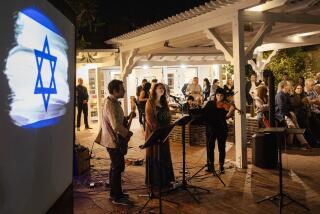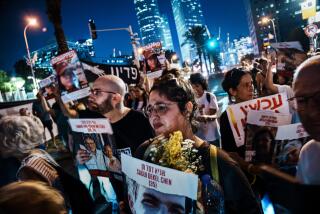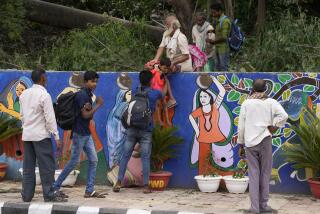Fleeing, hiding, dying
- Share via
MADRID — Esperanza Aguirre, a prominent Spanish politician, returned home from Mumbai on Thursday only hours after landing in the Indian city. She had escaped death by running barefoot through blood.
Like the other Western survivors and victims of the attacks, Aguirre experienced firsthand the strategic agility of terrorism. It has become increasingly difficult for Islamic extremists to pull off strikes in the heart of the West, as they did with the Madrid train bombings of 2004. If Islamic militants, as alleged, are behind the Mumbai attacks, they turned to targeting Westerners in a thriving commercial hub of the developing world.
The prize for the gunmen may have been Westerners, but as in past attacks, locals bore the brunt of the violence. Most of the dead were Indians.
Aguirre, the president of the regional government of Madrid, checked in to Mumbai’s Oberoi hotel on Wednesday with a delegation of Spanish business executives. She struck up a conversation in the lobby with a childhood friend who was visiting separately. Then the shooting started.
“Only when it turned into a machine-gun volley, clearly a sustained shootout, did I realize what was happening,” Aguirre said at a televised news conference here Thursday morning. “We threw ourselves behind the reception desk.”
The hotel staff “put us first in the kitchen, then the storerooms of the kitchen, then the laundry, then they took us to the offices of the manager,” she said.
As the guests fled aided by hotel employees, Aguirre lost a shoe. She removed the other one and ran on, barefoot. The delegation piled into cars and zoomed back in the direction of the airport, only to encounter a traffic jam caused by an explosion. After making their way through side streets to the international terminal, they flew back to Madrid.
Aguirre is known for an unflinching style and elegant outfits. But on Thursday, she met with reporters looking weary and rumpled in the same clothes she had worn for the trip with less-than-chic white shoes and socks that replaced those she had lost in the carnage at the Oberoi.
“I did not see the terrorists or wounded people,” she said. “I didn’t even know they were terrorists. I only saw the blood that I had to cross barefoot. I stepped in quite a few puddles of blood.”
The gunmen who stormed 10 targets, including luxury hotels and a Jewish center, were clearly hunting for foreigners. They singled out Americans, Britons and Jews to take as hostages. Although the numbers were by no means definitive, the scores of dead included at least eight foreigners, and dozens of others were wounded, taken hostage or trapped by the chaos of gunfights and explosions.
The cross-section of prominent foreigners reflected Mumbai’s reputation as a thriving center of international business. In addition to the Madrid delegation, a group of legislators from the European Parliament was among those pinned down by the siege. Several of the legislators gave interviews to media back in Europe during the ordeal, technology providing real-time snapshots of people swept up in the drama.
The dead included a British shipping magnate, Andreas Liveras, 73, who had made his fortune selling luxury yachts after emigrating from Cyprus as a young man. He died of gunshot wounds at St. George’s Hospital in Mumbai.
Shortly before his death, Liveras talked by cellphone to the BBC from a refuge at the Taj Mahal Palace & Tower. He had gone to the hotel for dinner after hearing it had the best curry in Mumbai, according to media reports. The diners hid under tables after gunshots erupted, then made their way to a salon with hundreds of other people.
“There must be more than 1,000 people here,” Liveras told the BBC. “There are residents and tourists and locals. We are not hiding; we are locked in here. Nobody tells us anything -- the doors are locked and we are inside.
“The last bomb exploded about 45 minutes ago, and it shook the hotel up,” he added. “Nobody comes in this room and nobody goes out, and we don’t really know. All we know is the bombs are next door and the hotel is shaking every time a bomb goes off.”
Another fatality, Ralph Burkei of Germany, tried to escape from the Taj Mahal Palace but fell onto a lower roof. The gravely injured Burkei, a 51-year-old media entrepreneur from Munich, managed to call a friend in Germany, according to German media reports. Burkei told the friend all his bones had been broken and that he did not think he would make it if he did not get help.
With many foreigners unaccounted for early today and confusion widespread, diplomats and security agents of many countries worked phones and roamed Mumbai trying to help. In addition to monitoring a standoff at the Nariman House, the Jewish center where hostages reportedly were being held, Israeli officials sought to establish the whereabouts of 20 missing Israelis, according to their country’s Foreign Ministry. Italian diplomats worried about the plight of seven Italians trapped in hotel rooms, including a mother and her baby girl.
In condemning the bloodshed, British Foreign Secretary David Miliband said: “This is a callous, inhuman and indiscriminate attack on people of all races and all religions. This attack in Mumbai is an attack on all of us because democracy in India is vibrant and because Mumbai is one of the world’s most diverse cities.”
--
More to Read
Sign up for Essential California
The most important California stories and recommendations in your inbox every morning.
You may occasionally receive promotional content from the Los Angeles Times.










